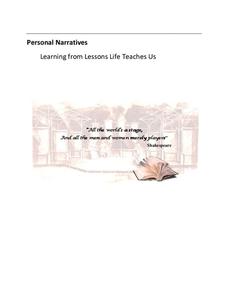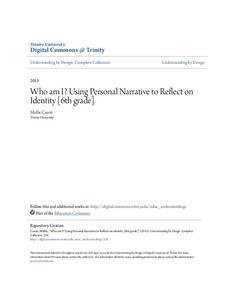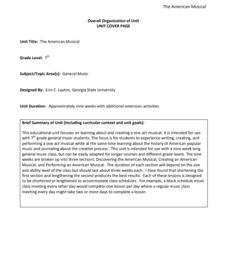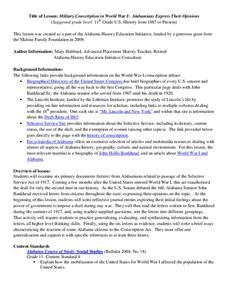Channel Islands Film
Arlington Springs Man: Lesson Plan 2
West of the West's documentary Arlington Springs Man and a two-page scientific article about the same topic provide the text for a reading comprehension exercise that asks individuals to craft a one page summary of information gathered...
Channel Islands Film
Magic Isle: Lesson Plan 1
What are the factors that limit growth and expansion? As part of their study of Catalina Island, class members view the West of the West's documentary Magic Isle and research William Wrigley and the Santa Catalina Island Company. After...
Cornell University
Nano Interactions
Tiny particles can provide big learning opportunities! Middle school scientists explore the world of nanoparticles through reading, discussion, and experiment. Collaborative groups first apply nanotechnology to determine water hardness....
Thoughtful Education Press
Personal Narratives: Learning from Lessons Life Teaches Us
"First Appearance," Mark Twain's tale about overcoming stage fright, serves as a model of a personal narrative and gets young writers thinking about milestones in their own lives. After examining student models and considering the...
Mr. Beem's Social Studies
Civil Rights Project: The Long Civil Rights Movement
Investigate milestones along the path that lead to the American Civil Rights Movement of the 1960s. After researching key people, events, court cases, and legislative orders, teams present their findings as a magazine, newspaper, or...
Trinity University
Who Am I? Using Personal Narrative to Reflect on Identity
Who am I? Pupils work to answer this question through a unit that explores personal narratives and identity. Exit tickets for activities that examine different poems, short stories, and autobiographical writing serve as prewriting for...
NET Foundation for Television
1850-1874 Homestead Act Signed: Who were the Settlers?
Life in the great, wide-open spaces of the West! Scholars analyze the reasons behind the vast movement to the Great Plains after the passing of the Kansas-Nebraska Act and the Homestead Act. Using photographic, document, map, video, and...
NET Foundation for Television
1850-1874 Railroads and Settlement
Have you ever wondered how your town was placed where it is? Scholars research the impact the advancement of the railroad due to the passage of the Kansas-Nebraska Act had on the formation of civilization in the Great Plains. Map...
Johnny Mercer Foundation
The American Musical
General music students learn about the history of popular American music by creating and performing a one-act musical. After researching and creating an American Musical timeline, class members write a song with lyrics using Jam Studio,...
Crabtree Publishing
Why Does Media Literacy Matter?
Criticism of news and entertainment journalism is at an all-time high. Help 21st-century learners develop the media literacy skills they need to become critical consumers with a three-lesson guide the looks at persuasive techniques used...
J. Paul Getty Trust
Looking and Learning in the Art Museum — Lesson 1
To prepare for a field trip to a local art museum, art class members journal their initial reactions to a reproduction of the work they will focus on during their visit. The whole class then considers the artistic elements in the piece...
Alabama Learning Exchange
Imaginary Numbers? What Do You Mean Imaginary?
Don't worry, this resource actually exists. Scholars learn about imaginary numbers and work on problems simplifying square roots of negative numbers. As an extension, they research the history of imaginary numbers.
Alabama Department of Archives and History
Alabama Tenant Farmers and Sharecroppers, 1865 to Present
The tenant farming and sharecropping systems that developed in the South after the Civil War, the reasons for their development, and the eventual decline of these systems are the focus of this two-day plan.
Alabama Department of Archives and History
Alabama's 1901 Constitution: What Was at Stake?
Who should be able to vote? As part of a study of the 1901 Alabama Constitution, class members examine primary source document that reveal the reasons the authors gave to support their positions on this question and their assumptions in...
Alabama Department of Archives and History
Alabama's Secession in 1861: Embraced with Joy and Great Confidence. Why?
From December 20, 1860 to June 8, 1861, eleven states seceded from the Union. Alabama seceded on January 11, 1861. Why did so many white Alabamians want to secede? Why did they believe the South could win the war? These are the essential...
Alabama Department of Archives and History
America in Space: German Voices from Huntsville, Alabama
Project Paperclip, the Redstone Arsenal, and the Huntsville Space Center are all featured in a resource that investigates the contributions of Dr. Werner von Brawn and other German scientists to the US space program. Working individually...
Alabama Department of Archives and History
Camp Aliceville: The Story of WWII Prisoners of War Who Came to Alabama
POW camps in the United states? In Alabama? The German POW camp in Aliceville, Alabama is used as the focus of a study of the more than 700 camps built in the US during World War II.
Alabama Department of Archives and History
Conflict in Alabama in the 1830s: Native Americans, Settlers, and Government
To better understand the Indian Removal Act of 1830, class members examine primary source documents including letters written by Alabama governors and the Cherokee chiefs. The lesson is part of a unit on the expansion of the United...
Alabama Department of Archives and History
Convict Leasing in Alabama: a System That Re-Enslaved Blacks After the Civil War
The post-Civil War convict leasing program, rarely covered in textbooks, is the focus of a lesson that asks class members to use information drawn from primary source documents to assess the program. While the focus is on Alabama's...
Alabama Department of Archives and History
Military Conscription in World War I: Alabamians Express Their Opinions
If called, would you go? Should the US government have the power to impose a draft during any war? The Selective Service Act of 1917 (aka the Conscription Act of 1917) authorized the drafting of men into the military for only the second...
Alabama Department of Archives and History
The Great Depression - Hard Times Hit America
To gain an understanding of how the Great Depression affected everyday citizens, class members examine letters written either to the president or to the governor of Alabama asking for assistance.
Alabama Department of Archives and History
The Wrong Side of History: How One Group Justified Its Opposition on the Freedom Riders and Civil Rights for African Americans
Designed as a supplement to the study of the Freedom Riders, this resource uses primary sources to reveal the views of those who opposed the Freedom Riders. After careful study of the arguments presented by the members of the Montgomery...
Alabama Department of Archives and History
Two Different African-American Visions: W.E.B. Du Bois and Booker T. Washington
The strategies civil rights activists Booker T. Washington and W.E.B. Du Bois proposed for blacks to achieve racial progress is the focus of an activity in which class groups identify the strategies as well as the benefits and drawbacks...
Alabama Department of Archives and History
What Were They Thinking? Why Some Some Alabamians Opposed the 19th Amendment
To better understand the debate over the 19th Amendment, class members examine two primary source documents that reveal some of the social, economic, racial, and political realities of the time period.
Other popular searches
- Grading Rubrics for Poetry
- Peer Grading Rubrics
- Writing Grading Rubrics
- Presentation Grading Rubrics
- Science Grading Rubrics
- Lab Grading Rubrics
- Peer Grading Rubrics Group
- Grading Rubrics Business

























